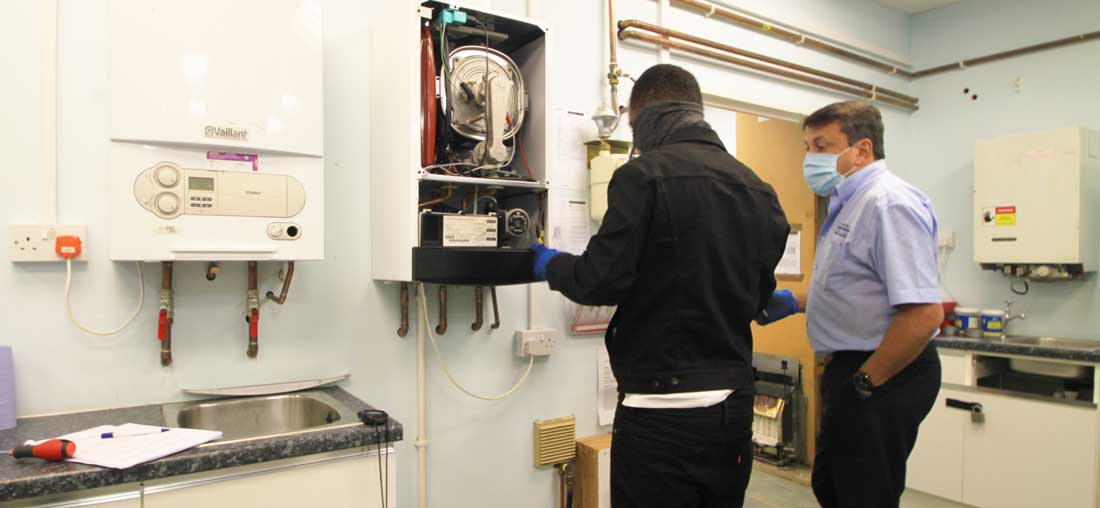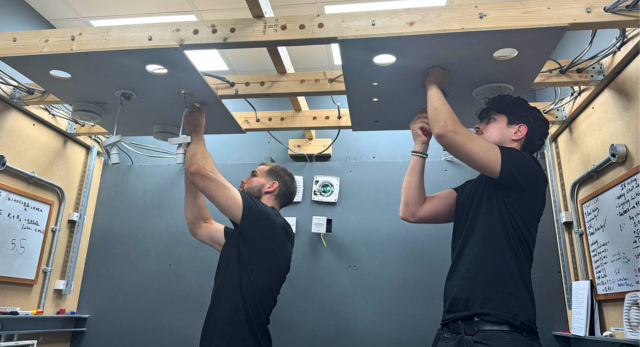The future of gas in the UK is a hot topic amongst many installers. Alternate energy sources and the shift away from fossil fuels has a lot of installers trying to predict what will happen.
At the moment natural gas is the preferred heating option for most homes across the UK. According to research done by Statista earlier this year, 95% of houses in the UK have central heating systems and 86% of these run on gas.
While it’s true that the government has committed to cutting CO2 emissions and phasing out the use of fossil fuels, if you’re looking for a reliable stream of work now and want to become part of the UK’s exciting energy future, training to become a gas engineer, will set you in good stead.
The gas network vs renewable energy
For starters, with nearly of 86% of existing houses running on gas, there’s a huge stock of boilers that require annual servicing for years to come.
Estimates state that there are currently 22 million boilers out there with 1.6 million new installations a year forecast until the cut-off in 2025. By any reckoning that’s a lot and we’re going to need an army of engineers trained to the highest standards to ensure the UK’s existing heating systems are running as efficiently as possible.
Although renewable energy is now very much in the spotlight, with the best will in the world, there’s no way we’ll be able to retrofit all the homes currently powered by gas boilers.
Last year, in an article published in HVP magazine, Neil Macdonald, Technical Director for HHIC (Heating and Hotwater Industry Council) warned of a coming shortfall in the number of qualified gas engineers. Over the next decade many current Gas Safe registered engineers will be retiring and he’s anxious that too few new engineers are stepping up to replace them. He said:
‘It is an undeniable fact that none of us are getting any younger. Where many trades seem to see a constant stream of new talent, the heating industry is one that is likely to suffer if we fail to address the issues surrounding a retiring workforce and attracting new recruits to take up the mantle.’
OK, but what happens when gas has finally had its day?
At the moment there are two main alternatives to gas. Heat pumps (primarily Air Source Heat Pumps – ASHP) and Hydrogen.
Heat pumps in the UK
Let’s deal with heat pumps first. They’re squarely in the frame for new-builds and at the heart of the Government’s Green Homes Grant, where homeowners are being encouraged to reduce the carbon footprints of their homes.
When your boiler fails, it’s worth thinking about future-proofing your heating system and for many, ASHPs offer the solution, but they are not an option for every home. They’re best suited to very efficient properties and are not always compatible with existing hot water and heating systems so a costly overhaul of the whole system is required. This is why they are most popular in new builds.
Most significantly, it’s thought that if there were to be a substantial uptake in this technology in the near future, the national grid couldn’t cope. At the moment, we do not have enough electricity to power a mass roll-out of ASHP units.
ASHPs have been the mainstay of heating systems in Europe for years and it seems that we’ll be following in their footsteps, but in the UK it would appear a gradual uptake – a slow and steady rise – is the way to go.
Crucially, the heat pump industry is looking to existing gas engineers to take on the installation of ASHPs. With transferable experience and skills, gas engineers can move into this promising area of career growth with a short training course. The majority of installers required to deliver heat pumps under the Green Homes Grant will come from a plumbing and heating background.
If this sounds interesting, please take a look at our heat pump training course. We offer LCL Awards’ RQF Level 3 Award in the Installation and Maintenance of Heat Pump Systems, a qualification that has been designed specifically for experienced heating installers wishing to fit heat pumps in domestic and small commercial properties.
Now, what about Hydrogen?
In recent years the Government has invested heavily in the development of hydrogen as a major heating fuel for the UK – and an eventual replacement for natural gas.
Trials at Keele University and subsequent demonstration projects in Leeds and in Scotland have shown that we can use our existing gas infrastructure to deliver hydrogen/gas mixes to homes and even use existing gas boilers once they’ve been modified by a gas engineer. Boiler manufacturers have already designed boilers that can run on both the gas/hydrogen mix and hydrogen on its own.
Cadent, who ran the hydrogen trial at Keele with a mixture of 80% gas and just 20% hydrogen, believe that if this blend was to be rolled out across Britain, CO2 emissions would be reduced by six million tonnes; the equivalent of taking 2.5 million cars off the road.
As technology develops we’ll be able to decrease the amount of gas in the mix until it’s purely hydrogen, which produces just water on combustion, therefore contributing significantly to our reduced CO2 emissions target.
It’s exciting stuff. Scientists are working on ways to produce the amounts of hydrogen we’d require, as well as carbon capture techniques to safely handle the CO2 produced during Hydrogen production.
The gas industry is currently looking to produce training and operating criteria so that existing gas engineers will be able to handle the changeover to hydrogen, as they do to LPG right now.
So what of the future for new entrants to the gas sector?
Whatever the future holds, there’s a place in it for gas engineers. In all likelihood we’ll be looking at a mixture of ASHP and hydrogen systems and those who are prepared to invest the time and money in training today will reap the rewards of tomorrow.
To find out more about our excellent MLP (Managed Learning Programme) designed for new entrants to the gas sector please click here. We’ll equip you with all you need to work as a gas engineer now, while providing the perfect grounding to diversify in the future.









